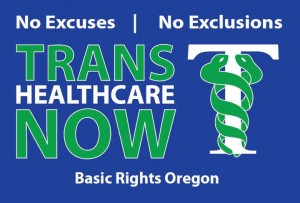 This is a re-posting of a Facebook message from trans advocate Tash Shatz.
This is a re-posting of a Facebook message from trans advocate Tash Shatz.
When I was sixteen I woke up one night in a cold sweat in the worst pain I had ever experienced. I felt like I was being repeatedly stabbed in my abdomen. My only guess was that I was experiencing super heinous period cramps. I was nauseous and the pain washed over me in violent waves. My mom and I were soon on our way to the emergency room, and we found out I was passing the first of what would be many kidney stones.
That night at the ER my experience was typical of what would happen as I visited the hospital several times over the next few years. Staff members stumbled over pronouns, sporadically use my preferred name, and asked me what medications I was on. When I answered “testosterone,” the hospital staff launched into a line of questioning about my gender identity – what surgeries had I had? What did I plan to have? What did transgender mean? On more than one of my visits I heard nurses whispering behind the patterned curtain across the space which held my bed. They were talking about my gender.
While I could simply move on most times, it became traumatic when it happened over and over again. No matter what notes were in my chart – and sometimes even because of these notes – issues of basic etiquette and medical competency dominated my experiences. I began to dread not only visits to the ER, but to any doctor for any reason. Front desk staff argued with me when I came for my OBGYN appointment. Whether I had a cold or a kidney stone, my gender was always questioned, my body and identity always became the focus of the visit. Because of this I began to avoid seeking medical care, even when I needed it.
When I was 18, I traveled to Canada for top surgery. As a college student I was lucky to have health coverage through my mom, but it did not cover this or any other transition-related procedures. I paid over $7,000 out of pocket. This money came out of a fund generated by a lawsuit filed when I was seven years old. I survived sexual abuse in my elementary school, and I was awarded a sum of money as compensation. While I’m ever grateful that I had access to surgery because of these funds, I know that the money could have been used to help pay off the tens of thousands of dollars I now have in student loan debt. I also know that I am among a lucky few who have had financial resources from any source to put towards physical transition.
We’ve all heard or had stories like mine. Crappy treatment from medical staff is what most trans people can expect when we visit most medical providers. Though I feel blessed by the wonderful providers I have come to know who are friendly, competent, and even trans-identified, I know that in most places it’s difficult or impossible to find these folks. Many of my friends have spent or are spending years saving up for surgeries that almost no insurance providers cover. And whether or not trans and genderqueer people want to transition physically, whether or not we have insurance or don’t, many of us are simply not treated with basic respect and fairness by medical and insurance providers.
Over the past year as a staff member with Basic Rights Oregon I’ve been working in the Trans Justice program with an incredible group of volunteer leaders who make up the Trans Justice Working Group. We’ve been focusing specifically on a statewide campaign to end discrimination against trans folks in health care. Because BRO is a policy and advocacy organization, we’re concentrating on how we can make policy changes while also supporting the work of individuals and groups doing provider education work.
We are in the midst of seeking stories about discrimination based on gender identity and expression in health care and insurance. I’m sharing my story here because, as Joe LeBlanc so beautifully put it, I believe we need to address this issue both through legislation as well as through personal story sharing to make real change happen.
If you have experienced or witnessed the effects of health care discrimination, please take a moment to fill out this form: http://bit.ly/g5rvgx
Your story may be used to educate lawmakers, reporters, BRO supporters, and the general public on the need for trans-inclusive health care. And, of course, your story will not be used in any of these contexts without getting your consent first.
Every story is important, whether based in insurance discrimination, denial of gendered services like annual exams, lack of provider competency or any other area. We understand that some folks may want to remain anonymous in their story telling, and that is definitely an option people can choose with submitting their stories online.
We are hard at work along with our Trans Justice Working Group to increase access to health care for trans Oregonians—and your story is a crucial part of this work! Help end health care discrimination tell your story and spread the word! http://bit.ly/g5rvgx
If you have any questions or concerns, please don’t hesitate to contact me: tash at basicrights dot org or 503-222-6151 ex 110.


Thank you so much for reposting this and to the person who was brave enough to express what so many of us have experienced on all levels across the board.
Yes, doctors, medical staff and anyone else working in the field should know how to respectfully work with us without the 20 questions and the whispering to eachother during each visit.
Nick